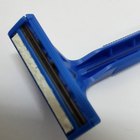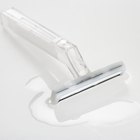
Magic Shaving Powder is a depilatory designed to help African American men cope with the problem of pseudfolliculitis barbae or razor bumps originating from ingrown curly hair. The American Osteopathic College of Dermatology states that this condition affects nearly 60 percent of African American men. Since it stems from curly hair growth and not an infection, treatments entail not shaving or modifying your shaving techniques, according to San Francisco State University. Magic Shave Shaving Powder works for some men to remove facial hair and minimize the occurrence of razor bumps. Proper mixing of the product leads to more effective hair removal.
Place 2 overflowing teaspoons of Magic Shave Shaving Powder into a small nonmetal bowl.
Add 2 teaspoons of cool water.
Mix with a plastic spoon or other nonmetal utensil until a creamy paste forms.
Apply the mixture to your beard with a shaving brush. Use a smaller brush to reach hard-to-reach areas. Dab with water to keep the paste moistened if it dries.
Remove the paste with a nonmetal spatula or other item with a flat, dull edge after five to seven minutes. Rinse your face thoroughly.
Wait at least 36 hours before using the mixture again.
Related Articles

How to Get Rid of Irritation From ...

How to Cure Razor Burn on a Woman's ...

How to Stop Facial Redness From Shaving

Shaving Soap Recipe With No Lye

How to Prevent Underarm Bumps

Glycolic Acid & Razor Bumps

How to Hide the Appearance of a Shaving ...

Hyperpigmentation and Shaving

Will Cream of Tartar Whiten Teeth?

How to Use Magic Shave

How to Make a Mustache Less Noticeable ...

How to Shave Pubic Hair on Men

How to Make Black Eyebrows Brown

Proper Way to Shave a Mustache

How to Close Pores After Shaving

Homemade Bleaching Cream

How to Get a Closer Electric Shave

How to Get Smooth Shaved Legs When Hair ...

How to Clear Up Red Bikini Line Bumps

How to Make Xylitol Toothpaste
References
Writer Bio
Katina Coleman is a research psychologist who has been writing since 2004. She has published and reviewed articles in various academic journals and consults on research projects related to health and education. Her research interests center on patient-doctor communication and cancer health disparities. Coleman holds a Ph.D. in psychology from Wayne State University.
Photo Credits
Jack Hollingsworth/Stockbyte/Getty Images